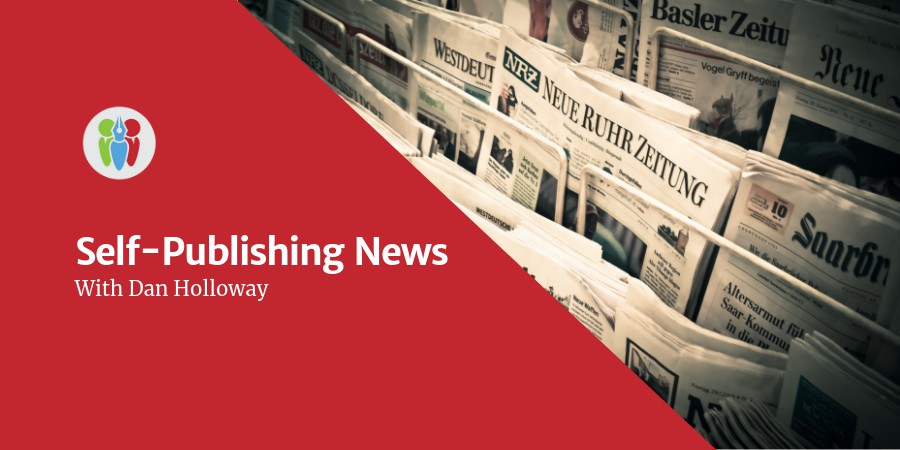
ALLi News Editor Dan Holloway
In this week's Self-Publishing News, ALLi News Editor Dan Holloway fills us in on the latest with a look at Kobo's 10th birthday and some projects to promote reading.
It's one of those often quoted platitudes that you can do far less than you imagined in a year, and far more than you imagined in 10. The next couple of weeks many of us will be reflecting on the truth or otherwise of that, as a decade draws to a close. In self-publishing terms, we've seen a couple of slow-ish years recently, though the slow rise of audio and AI signal impending seismic shifts. But I don't think anyone can doubt the upheaval of the past 10 years, at the start of which the Kindle was still in its cradle.
The future: audio & Brexit

Photo by Dollar Gill on Unsplash
I’ve mentioned before how the news often clusters around overly-appropriate themes. That is once more the case as we enter the season of looking forward and looking back. The first items in this week’s news are very much looks to the past and the future.
First, a story we heard a lot about 3 years ago, and we’re going to be hearing a lot about again in the coming year. Last week’s election means Brexit is almost certain to happen on January 31st next year, with a brief transition period coming to an end on December 31st. That is all the time the U~K and EU have to put together a new trade deal. If they don’t there will be a so-called “No Deal” Brexit. Galley Beggar Press’s Sam Jordison raised a very particular concern about a No Deal. Books are complicated products to put together. Not only tariffs but the necessity to designate a country of origin for a book could become a logistical nightmare. Indies already struggle with pricing and logistics for paper books. The struggle may be about to get harder
This week also saw a fascinating post looking at the way audio may change over the next decade. Crystal ball gazing is always tricky. But one piece of audio news that is very concrete and could have a massive impact is the launch of Suno. Suno is Amazon’s subscription audio store based in India, expanding its offering beyond Audible.
The past: Kobo turns 10
I was surprised to learn that Kobo has just celebrated its 10th anniversary. That makes it substantially younger than Smashwords and Kindle. It’s interesting how far Kobo has come in that time. They brought out an ereader after the Kindle. And Kobo Writing Life followed KDP. But Kobo has not become just a me-too Amazon clone. It is, of course, now Rakuten Kobo, having teamed up with the etailing giant. But most of all, it has positioned itself cannily within the literary market. One key move has been Overdrive, which means that your Kobo books can now feature in the world’s libraries. And the partnership with Findaway Voices means your audiobooks can have a flexibility not possible through Amazon. Here’s to the next 10 years.
Increasing discovery
As indies, discovery is our holy grail. The platforms we use know that, and are constantly trying to lure us by dangling “better discovery” at us. Many of the acquisitions and partnerships I report on are attempts to improve discovery. First up this week is PublishDrive, who have added Hoopla and Dreame to their distribution channel.
Storytel are explicitly out to improve discovery by partnering with Clipsource. They will be opening a new media centre, tapping into Clipsource’s key position in media discovery.
Encouraging reading
Finally two interesting items on the theme of reading. First up, a new competition – always something of interest. The Jolabokaflod Reading for Pleasure prize is of particular interest to me as it’s not a regular writing prize. The £500 first prize is for 500 words. But not words of flash fiction. Rather, the winner will be the best idea for getting people reading for pleasure!
Second, an interesting initiative from Selfpubcovers. The company – which supplies, well, you guessed it – covers to self-publishers – is partnering with Pro Literacy. Through December they will be donating $5-10 for every cover published to improve the literacy of the American adult women who struggle with reading.
Kobo's 10th birthday, new projects to promote reading & other top #selfpub news stories for #indieauthors, in one quick read, by #ALLi News Editor Dan Holloway @agnieszkasshoes #digitaleconomy #publishingopenup Share on X
Over to You
Were you self-publishing 10 years ago? How has it changed since you started? Let us know in the comments below.
Upcoming Conferences and Events
FEBRUARY 2020
San Francisco Writers' Conference, 13-16 Feb [San Francisco]
MARCH 2020
London Book Fair, 10-12 Mar [London]
APRIL 2020
Self-publishing Conference, 25 Apr [University of Leicester]
MAY 2020
BookExpo, 27-29 May [New York]
JUNE 2020
Dublin Writers' Conference 19-21 Jun [Dublin]





Not quite ten years ago. My first self-pub was in mid 2011. I had been received a trad contract at a major publisher for two books in 2008, then the aquiring editor left stranding them. After three years of back and forth to get them back as the new incoming editor wasn’t interested, I scheduled them or 2011 indie releases. My next trad contract was with a much smaller press in 2010, first publication in 2011. It was a great comparison of what a trad publisher would do for me vs indie. My first indie book, released within one month of the trad book, did three times more in the first year and in a genre that is less popular.
The most significant change to me is the competition and discoverability. In 2011 to about 2014, if one did all the normal things–build an email list, keep up with social media, keep putting out new products regularly, you could build a decent following without advertising. That was when indies were only competing against approx. 600K books in 2011 between both self-published and trad published (not counting reprints of public domain titles). Now we are competing against over 1 million indie books being released every year and another 750K trad books.
Though not impossible, it is extremely difficult to get discovered without paid advertising. Also, though one can still build a significant email list with paid advertising and give-aways, it is more difficult to get engaged loyal readers to open emails because they are so tired of all that comes into their email inbox these days. Again, not impossible but self-publishing and discoverability take a lot more work on the business and technology side than it used to. At least that is my experience, in spite of having more than twice the inventory I had in 2014.